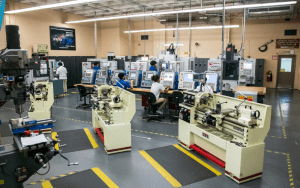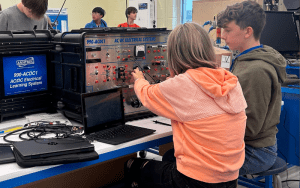
Passaic County Technical Institute engages students in hands-on learning in a state-of-the-art manufacturing technology classroom.
There are more than 35,000 open manufacturing positions in N.J., according to the New Jersey Manufacturing Extension Program. One reason for the high number of vacancies is simple math, according to NJMEP Chief Executive Peter Connolly. “There’s a big gap between the number of younger people moving into manufacturing and the number of older ones retiring,” he said. “That’s largely because of outdated stereotypes about manufacturing jobs.”
For years, high school graduates have been encouraged to go on to college — largely because of expectations of higher wages and job stability, Connolly noted. “But sharp increases in the cost of traditional higher education, along with higher wages paid by advanced manufacturing companies, have eaten away at that earnings gap.”
A Deloitte study released in 2022 reinforced that claim. “Even as domestic manufacturing is viewed as increasingly important to the economy, public perceptions of manufacturing are not in line with the current reality. For instance, many Americans are not aware of the increasingly high-tech nature of manufacturing, which is improving employee productivity and providing cutting-edge, transferable skills.” Additionally, manufacturing pay averages about $30 an hour, which is higher than service-related jobs ($28) and retail ($22), according to the report.
The perception gap is “likely contributing to the current shortage of applicants,” according to the Deloitte report, which was done jointly with The Manufacturing Institute, a 501(c)3 nonprofit workforce development and education affiliate of the National Association of Manufacturers. One TMI survey noted that “nearly 83% of manufacturers mentioned attracting and retaining a quality workforce as their top challenge,” while almost 45% of manufacturers said that they had to turn down business opportunities because they did not have enough workers.
“The situation is also being exacerbated by the exit of experienced Baby Boomers [who are retiring at an overall national rate of 10,000 a day across all occupations, according to published reports],” Connolly added.
Seeking solutions
Organizations like NJMEP are taking steps to help alleviate the shortage. “We offer a number of programs – and partner with other organizations for others – that are designed to help manufacturing companies connect with potential employees,” Connolly said. “One is the New Jersey Defense Manufacturing Community Consortium, where manufacturers have access to a workforce that’s trained and ready to contribute. In addition, companies in the NJDMCC have an opportunity to fill key advanced manufacturing technology needs for the federal Department of Defense while creating transition opportunities for new defense technologies.”
Manufacturers that participate in the NJDMCC can be connected with job seekers who are either veterans or family members of veterans, while job seekers who join the community receive industry-relevant training from NJMEP and access to nationally recognized industry certifications, he added.
NJMEP is also reaching out to high schools with a mobile “Creators and Makers” program, Connolly said. “The program will utilize a recreational vehicle, equipped with augmented reality training equipment, that visits high schools across the state to give students a feel for different kinds of manufacturing experiences,” he explained. “The RV exhibits will include 3D printers, co-bots, welding, and CNC [Computer Numerical Control] machining, a computerized manufacturing process where pre-programmed software and code controls the movement of production equipment.
“We’ve got to reach students at a younger age, like middle school, and we need to educate parents about the well-paying opportunities their children can pursue in manufacturing,” Connolly added. “Part of the challenge is that high school guidance counselors get rated on their college placement numbers, not employment. So many young students do not find out about the life skills and sustainable income – $65,000 to $95,000 a year in many cases, with above-average benefits – that a career in manufacturing can offer.”
There has been a “strong resurgence of career and technical education programs in manufacturing,” according to Jackie Burke, executive director of the New Jersey Council of County Vocational-Technical Schools.
A nonprofit association created by state law to represent the vocational-technical school districts in New Jersey’s 21 counties, the NJCCVTS supports collaboration among its member school districts, which offer career programs in high-demand fields for 35,000 career-minded high school students as well as adults.
The organization and its 21 member districts “are helping to build a pipeline of next-generation manufacturing employees by both spreading awareness about the field, including what it is and the growing career opportunities in it, as well as expanding training programs to help students prepare for these opportunities,” Burke added. “Many expansion projects are supported by grants made possible through the voter-approved 2018 Securing Our Children’s Future Bond Act. The NJCCVTS recently produced a series of videos about career-focused programs offered across New Jersey’s vocational-technical schools. One of those programs involves videos focused on advanced manufacturing, which are available on the advanced manufacturing program page at careertechnj.org, as well as on the Council’s YouTube and social media, all using the CareerTechNJ moniker.”
About a decade ago, “many of the county vocational-technical schools had morphed their manufacturing programs into others with a broader engineering focus,” she related. “However, as awareness grew of the opportunities in manufacturing – largely due to the efforts of John W. Kennedy, during his time with NJMEP – our county vocational-technical schools began to develop focused programs to train students for modern manufacturing roles. Data from the N.J. Department of Labor and feedback from manufacturing employers throughout the state further verified the need for focused career programming in manufacturing and the rapidly evolving advanced manufacturing sector.”
Industry partners are “key to ensuring the curriculum remains relevant and students have opportunities to learn from current professionals,” she added. “Thanks to partnerships with local, national, and international manufacturing companies, such as Thorlabs Inc.; Festo Didactic; Triangle Manufacturing Co. Inc.; Intel, Allendale Machinery Systems; and others, many New Jersey-based county vocational-technical schools have thoughtfully developed new programs in advanced manufacturing and engineering technology; many started this academic year – or will soon – with financial support from grant funding through the 2018 Securing Our Children’s Future Bond Act.”
Burke said that “There are strong signs that today’s high school students are increasingly aware of advanced manufacturing as an exciting and lucrative career option. Morris County Vocational School District recently held a summer program for 9th and 10th grade students to introduce them to advanced manufacturing and more than 50 students participated. This is another example of how our county vocational-technical schools are helping to build an employment pipeline for manufacturers by generating interest and training opportunities early on in students’ high school careers.”
In September, Gloucester County Institute of Technology opened a “state-of-the art building to house a new Academy of Advanced Manufacturing and Applied Science, Burke noted. “Students will benefit from four years of focused learning, including how to use tools and technology that are creating highly specialized roles in advanced manufacturing,” she said.

Gloucester County Institute of Technology students learn in a brand-new building dedicated to advanced manufacturing.
And a nearly completed addition to the Gloucester Campus of Camden County Technical Schools will “house a new career program known as manufacturing engineering technology,” Burke added. “Specific to the new career program, the project will add an MET Career Lab, MET Design Theory Lab, three theory/instructional rooms, an MET Simulation Lab, an MET Physical Science Lab as well as a large group instruction area and related support spaces. Students will be able to earn industry credentials through the Smart Automation Certification Alliance. This MET program was developed in response to manufacturing industry needs in Camden County. Manufacturing is the fifth largest industry in the county in terms of the more than 14,300 individuals it employs each year. Camden County is home to 450 manufacturing establishments, and jobs in manufacturing are projected to grow 8% by 2026.”
In North Jersey, the Morris County Vocational School District and the County College of Morris received funding, “made possible through the Securing Our Children’s Future Bond Act, to build a new career training center on the CCM campus,” Burke said. “The new Morris County Career Training Center will house 10 new CTE [Career Technical Education] programs serving an additional 500 high school juniors and seniors. Manufacturing is among 10 new programs, all of which target high demand employment industries identified by the New Jersey Department of Labor. This new partnership between MCVSD and CCM also enables Morris County students to earn up to 18 college credits per year. After completion, students will be able to either enter the workforce or continue their postsecondary education by transitioning into an associate degree program at CCM. They also will have the option to attend a four-year college after completing high school.”
This article originally appeared Sept. 25, 2023 in NJBIZ.



